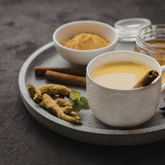In the growing world of plant-based living, not all plant milks are created equal. While store-bought options are convenient and fortified, fresh, homemade plant milk often retains a more natural nutrient profile, richer in bioactive compounds and free from additives. Let’s explore what science says about the nutrients that truly thrive in fresh plant milk and why making it yourself can make all the difference.
The Science of Processing and Nutrient Retention
Most commercial plant milks undergo pasteurization or ultra-high temperature (UHT) processing to ensure shelf stability. These methods extend shelf life but can degrade or alter sensitive nutrients such as:
- Vitamin C and B vitamins, which are heat-sensitive and easily oxidized.
- Polyphenols and antioxidants, naturally found in nuts, seeds, and grains, which diminish when exposed to heat and air.
- Enzymes and unsaturated fats, which can be denatured or oxidized during processing and long storage.
A 2023 comparative study found that homemade almond and oat milks contained up to 40% more antioxidants than their commercial counterparts, alongside higher levels of naturally occurring minerals such as magnesium, potassium, and zinc.
What Thrives in Fresh Plant Milk
1. Natural Micronutrients
When you make milk directly from whole nuts, seeds, or grains, the process preserves their natural nutrients. Vitamin E, magnesium, and healthy fats remain largely intact, contributing to skin health, immune support, and heart protection.
2. Bioactive Compounds and Antioxidants
Freshly blended ingredients contain polyphenols, flavonoids, and phytosterols, plant compounds known for their anti-inflammatory and antioxidant properties. These compounds decline significantly after industrial heat processing.
3. Plant Proteins and Fiber
Fresh milk retains fine particles of the plant source, contributing to a small but meaningful amount of protein and fiber. This natural texture provides mild satiety and digestive support, something most commercial milks lack due to extensive filtering.
What Packaged Milk Offers, and What It Lacks
Store-bought plant milks are typically fortified with calcium, vitamin D, and B12, nutrients that are crucial but often absent in plant sources. However, this fortification comes with trade-offs:
- Industrial fortification adds isolated nutrients, not the synergistic matrix found in whole foods.
- Many packaged options contain stabilizers, emulsifiers, and added sugars to improve texture and taste.
-
Even fortified calcium can settle over time, making the nutrient content inconsistent without shaking.
So, while fortified packaged milks fill certain gaps, they often lack the vitality and integrity of fresh plant-based nutrition.
Making Fresh Milk Even More Nutritious
Homemade plant milk isn’t just fresher, it can also be customized and enhanced. With small adjustments, you can create a beverage that matches (or surpasses) commercial fortification.
- Add natural calcium sources: Blend in sesame seeds or a pinch of calcium carbonate powder.
- Boost omega-3s: Include chia seeds, hemp seeds, or flaxseeds.
- Support vitamin intake: Add a drop of vitamin D or B12 supplement if desired.
-
Preserve nutrients: Use filtered water and avoid overheating the milk after blending.
By doing so, you control both quality and quantity, ensuring your milk is as nutritious as possible, naturally.
Fresh plant milk stands out for its integrity of nutrients, absence of additives, and vibrant taste. It celebrates the food in its natural state, rich in antioxidants, healthy fats, and plant compounds that thrive without industrial processing.
And for those who love the idea of fresh milk but want convenience, the Milky Plant Plus offers an easy way to make homemade plant milk in minutes, freshly blended, heated if desired, and ready to enjoy at its nutrient-rich best.















